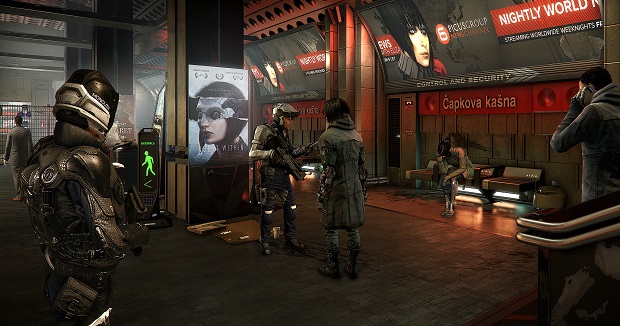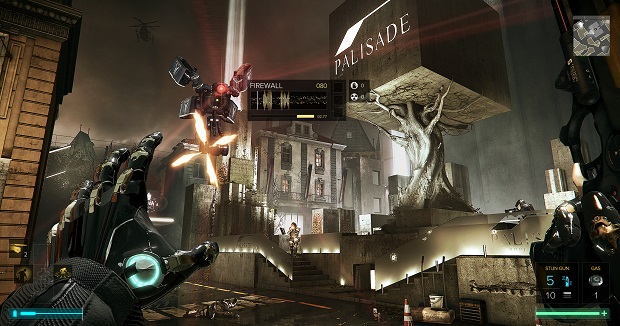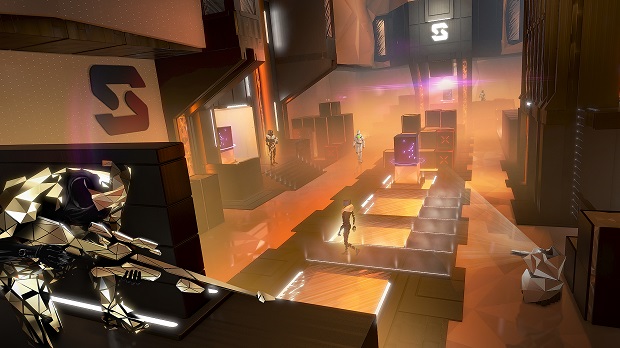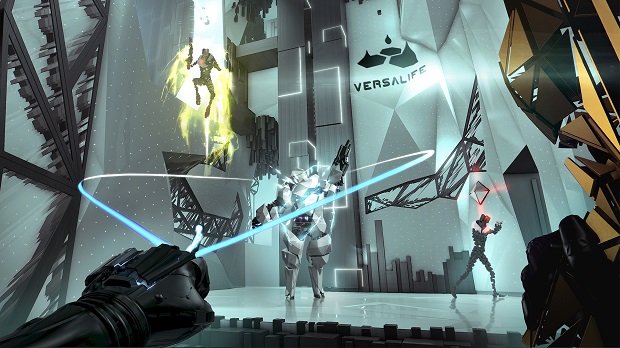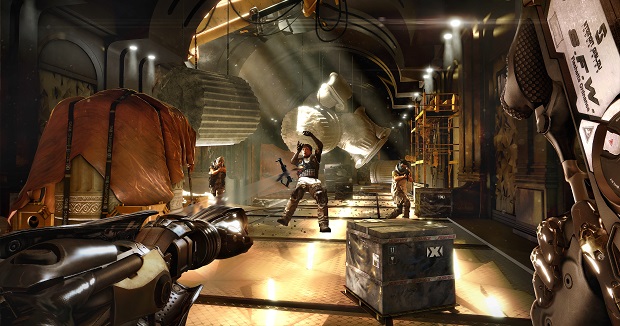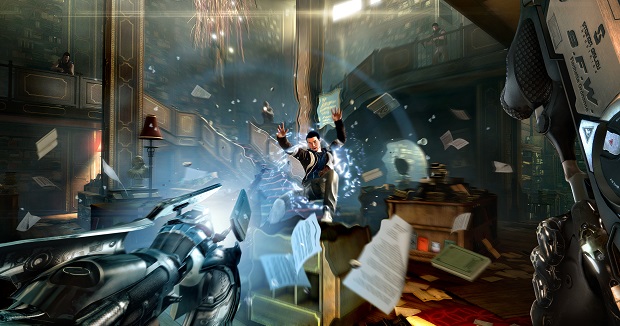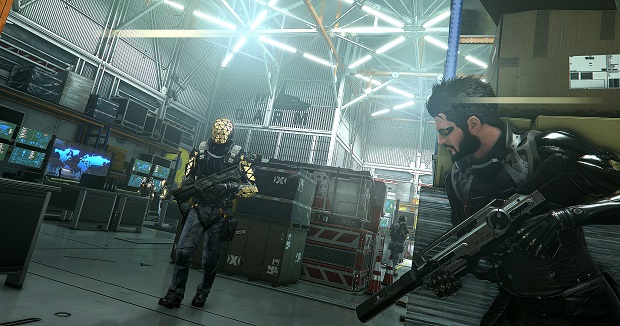Deus Ex: Mankind Divided's Transhuman Future Feels Too Cautious For Comfort
At home with Adam Jensen
Shower scenes seldom Make You Think, unless it's about what exactly you're getting for that Premium Netflix subscription, but if anything sticks out for me about the impressive yet oddly unexciting Deus Ex: Mankind Divided [official site], it's the sight of Adam Jensen washing his hair. Eidos Montreal's latest presentation begins in Jensen's new Prague apartment - a casually affluent man-den where you can phone other characters, watch newscasts that track your decisions through the story, answer emails, tinker with crafting resources, and generally get acquainted with the sleek, cadaverous sort-of-human in your charge.
As in Human Revolution, this adds a welcome domestic dimension to a protagonist otherwise defined by his ability to hide from people, sweet-talk them or blow them to pieces. We see Jensen wake, activate his own heads-up display with a groggy command, swing his gleaming kneecaps out of bed and pad across a dim expanse of consumables, standby lights and the Renaissance oil paintings so beloved of Eidos Montreal's artists. We see him trot into the bathroom and turn on the tap, and for the first time since I laid eyes on Mankind Divided back in early 2015, it feels like all that talk about the precarity of identity in a cybernetic world is coming to a head.
Does Jensen, a person who can transform his own skin to imperceptible gauze with a thought, really need to shower? Won't he, you know, rust? Less frivolously, does Jensen actually have genitals these days (the cutscene camera refrains from filling in the picture) and what are the implications of that, exactly? Deus Ex's lead identifies as male, but in all those years as the owner of a partly robotic, highly customisable body, hasn't he ever thought twice? Is gender a matter of the body you inhabit, anyway? In posing these ideas I'm betraying all sorts of assumptions and prejudices, but then again, being made aware of your own biases is a mark of skilled, socially engaged storytelling. Before leaving the shower, Jensen pauses to wipe the condensation from a single square of glass – a delicate, introspective gesture that speaks to a universe of uncertainty, on either side of the screen.
It's only a moment, though - soon forgotten in a familiar whirl of gunplay, stealth, hacking and oratorical duelling, as Jensen works his way through and around Prague to rescue a friend from some remarkably humourless gangsters. Mankind Divided's trailers make much play of the game's relevance to anxieties about the convergence of flesh and tech, but as with many a topical blockbuster, there's a certain timidity in practice, a tendency to treat on these subjects in safer, generalising terms.
The question of what gender really amounts to when the body you're born with is entirely malleable, for example. “It's not something that we've really touched on yet, definitely,” acknowledges Jonathan Jacques-Belletête, executive art director. “In terms of what this would bring in a transhuman world. But it's all interlinked anyway. What we talk about is what it means to human - when do you stop being human, can you stop being human? Is it really your fleshbag that makes you human, or is it what's in your head - your consciousness, your memories and experiences.
“And the answer is in the soup, when you play Mankind Divided or Human Revolution. Like I said, maybe the specific question of gender isn't present yet, but this idea of transforming oneself, taking evolution out of nature, or away from religion and theology, and then controlling it yourself through technology, is what we're looking at. And yeah, if you look at gender change, it's the technology, when the switch is almost complete, and I have two friends that have done it, male to female - what allows them to do what they've done is technology.”
It must be difficult, I suggest, to explore such topics through the lens of a million-dollar triple-A game, with all the associated commercial and production pressures. “Especially with the dialogue you hear in the industry, from videogame fans or whoever,” Jacques-Belletête agrees. “I don't want to go into this, but it's a tough time - it seems like it's a time where intelligence is rarer and rarer! And our industry seems - I don't know if it's because I know it better than other industries, but it really seems to be showing. You hear it in the discourse.”
If Deus Ex's portrait of a society transformed by the rise of cybernetics shies away from certain of the implications, Mankind Divided's backdrop is promisingly layered. Set two years after Human Revolution, it presents a world in which mechanically augmented people are a segregated underclass, resented for their enhanced capabilities and feared for their vulnerability to behaviour-changing hacks – a vulnerability that was exploited so disastrously at the end of the previous game.
That mix of potency and weakness to coercion channels the old bourgeoisie dread of a susceptible, overwhelming proletariat, easily misled by agitators with the gift of the gab, but augs are branded “deviants” in a number of senses. The recent “Mechanical Apartheid” trailer includes advertising shots of female athletes and models showing off their prosthetic limbs amid newsreel chat of “unnatural” behaviour and “playing god”, conjuring up a long, dismal history of reaction to women doing what they like with their own flesh.
As with its predecessor, the game is also alert to the dystopian potential of a future in which limbs and organs are manufactured and licensed. The augmented may enjoy superhuman strength, speed or perception, but they're caught in a web of intellectual property rights, their innards the legal belongings of companies who may enforce compliance by withholding the drugs that keep implants running. I'm not sure you could ask for a timelier work of the imagination, in an age when so many of us are content for corporations to own our personal data, vital services and, via the mechanisms of credit, the fruits of our labours. There’s even corporate ownership of the genetic structure of our food.
Still, how much of this is just scraping the headlines for plot points? Mankind Divided's depiction of cultures in thrall to oligarchs and tyrants may be intricate and occasionally provocative, but it's also prone to cliché - the impassive enforcer in a craggy bodysuit; the buzzing police quadrotor drone; the scrawny downtrodden in a scruffy hoodie, queueing at the checkpoint. It feels like there's more work to be done. I've yet to come across a mission or story in Eidos Montreal's universe that compares, for example, to how CD Projekt transforms the archetype of an ostracised werewolf in one early mission from The Witcher 3.
I'm also not yet blown away by how Mankind Divided handles, though Eidos Montreal has made a number of worthwhile improvements. It's the same rough template as in Human Revolution, but faster, angrier, much more amenable to vertical exploration, and with more cohesion between styles. Jensen is still an ultra-customisable hybrid of tank, ninja, keyboard whiz and private detective, capable of reaching an objective or resolving an encounter loudly, quietly, violently or peacefully, but he's now able to flow around cover, scuttle between hidey-holes on auto-pilot by aiming and tapping a button, and tweak his capabilities (e.g. by modifiying weapons) without breaking off to a menu screen.
Environments once again afford a number of routes, geared towards certain combinations of augmentations and tactics – you might punch through a wall to avoid a patrol, providing you've installed the rebreather that lets you pass through the gas trap on the other side. But there's more emphasis on acrobatic traversal and getting the drop on people, thanks to a new aerial dash augmentation and a last known position indicator that makes flanking small pockets of AI a cakewalk. Taking down everybody non-lethally needn't be the placid exercise it was in Human Revolution, providing you've equipped a set of electric knuckle darts. And should you find yourself in the firing line, there's now an aug that coats Jensen's torso in bulletproof chrome.
How exactly you deploy Jensen's skillset has ramifications for the story – a stealthy player might reach a secondary objective that has a bearing on a subsequent mission, while a Jensen who inclines towards heavy ordnance barges straight through. This generally rewarding campaign dynamic had its downsides in Human Revolution, as you were obliged to turn your nose up at large swathes of the arsenal if you wanted to explore particular outcomes. Mankind Divided has a solid if uninspired answer to that, though, in the shape of the new Breach Mode.
Dressed up in a familiar crystalline holodeck aesthetic, it's essentially the Deus Ex take on Call of Duty's Spec Ops mode - a series of one-off, combat-puzzle scenarios where you're free to try out the game's spread of augs and weapons without tripping over the storyline. The overall goal? Hack into the Palisade Bank, a fat warren of corporate secrets, roam its circuitry in first-person, disable or avoid “security programmes” (read: guards and turrets), and exfiltrate with some juicy data. What does juicy data get you? Credits to spend on weapons, gizmos and upgrades. What else does juicy data get you? A leaderboard placing and hopefully, the envy of your friends.
It's a familiar way of expanding a game's premise, bolted together as much for the sake of creating another vector for post-release updates, microtransactions (which include cards you can buy to modify each level's challenges) and DLC packs as anything else. But it's a sensible step towards making Deus Ex, the most storied of IPs, more of a sociable, pick-up-and-play game - the kind of thing you dip into on your lunchbreak because your level score has just been quashed by some gloating colleague on Twitter.
At the same time, in stripping away the fiction Breach Mode also makes plain that Mankind Divided isn't doing anything particularly out of the ordinary – every one of its tricks and tactics has an echo in Dishonored, the Splinter Cell series and Eidos Montreal's own Thief, to name a few peers or rivals. Jonathan Jacques-Belletête concedes of some enhancements that the aim is more to create momentum within Human Revolution's existing skillset than shoot for the horizon. “The verticality thing is something we've worked on, but it's not what our marketing is based on - nowhere does it say 'come play this game because we're the best ones at making you climb a ladder, jump from one balcony to another'. What we're saying is that within the metrics of what a Deus Ex experience is, we've added this extra layer.”
He does, nonetheless, envisage plenty of room for more drastic experimentation within the much-vaunted Deus Ex Universe - an umbrella brand that extends from comicbooks and novel adaptations to the just-announced Deus Ex Go, another touchscreen puzzle-board offering from Square Enix Montreal to go along with the Hitman and Lara Croft variants. It's unlikely that Eidos Montreal will hand off the main series to another studio, but the door appears to be wide open to spin-offs, providing they fit the overarching narrative.
“I think you could do pretty much any type of game with it. If you have a proper world, a proper lore [basis] that you've worked on, you know how its gears function, I think you could do anything. You could make a Deus Ex racing game! Honestly, once you start brainstorming you could have some XCOM-styled turn-based strategy, you could have a great partly open world side-scrolling game like Shadow Complex. I don't think there's any limit, really. I would have a blast transferring this property to any type of gameplay. The lore is there, the world is there, the aesthetic is there. It's all about how you make it fit the mold. I'd start that tomorrow, if I could.”
Starting sooner rather than later may be advisable. Deus Ex: Mankind Divided looks to tick every box its predecessor did, and the streamlining of the relationship between infiltration, exploration and battle is nicely judged thus far, but it's rather telling that the thing I recall most vividly from my hour or two with the game is that thoughtful spell in the shower. Deus Ex offers up a lavish fiction – the art direction, as ever, brilliantly expresses social tensions in how it melds or bashes together a range of period influences. But it has yet to really capture my attention and rock my preconceptions, whether in terms of how I sneak and shoot, or as regards the overlap between its fraught, messy world and ours.


